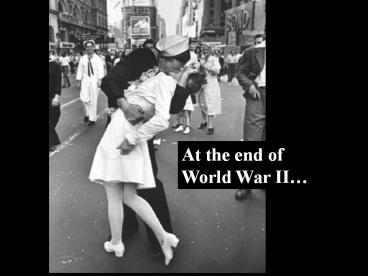At the end of World War II - PowerPoint PPT Presentation
1 / 47
Title:
At the end of World War II
Description:
Title: PowerPoint Presentation Author: Mark Last modified by: Ken Farshtey Created Date: 5/21/2005 5:20:06 PM Document presentation format: On-screen Show (4:3) – PowerPoint PPT presentation
Number of Views:90
Avg rating:3.0/5.0
Title: At the end of World War II
1
At the end of World War II
2
(No Transcript)
3
the world was in ruins.
4
People wanted peace
and needed the world put back together again.
5
But there were only two countries with the power
to rebuild the world
The United States
and
The Soviet Union
And, they were total opposites.
6
The United States wanted the world to have
democracy and capitalism, like itself.
7
But the Soviet Union wanted neither democracy or
capitalism
they wanted autocracy and communism.
8
The competition became known as the Cold War
and it split the industrialized world in two.
9
For the next 30 years, the two clashed over
..the Berlin Wall
10
For the next 30 years, the two clashed over
Chinas communist revolution
11
For the next 30 years, the two clashed over
the creation of Hydrogen Bombs
12
For the next 30 years, the two clashed over
the Korean War
13
For the next 30 years, the two clashed over
the Cuban Missile Crisis
14
For the next 30 years, the two clashed over
the exploration of space
15
For the next 30 years, the two clashed over
and the Vietnam War.
16
In Vietnam, Americas technologically advanced
military was defeated by guerrilla warriors
called the Viet Cong, who were supplied by China
and the Soviet Union.
17
So, when the Soviet Union invaded Afghanistan,
the US trained and supplied a group of guerrilla
warriors called the Mujahadeen to fight the
Soviets
(one of them was Osama bin Laden).
18
Just like the United States in Vietnam, the
Soviet Unions powerful military was defeated by
guerrillas supplied from outside.
19
After the war in Afghanistan, the Soviet Union
was almost bankrupt.
20
Sensing this, Americas new president, Ronald
Reagan, decided to try to end the Cold War by
bankrupting the Soviet Union.
He spent over a trillion dollars on new military
technology
21
including satellites designed to shoot down
incoming nuclear missiles with lasers.
It got a nickname based on a popular movie series
22
(No Transcript)
23
The Soviet Union went broke trying to keep up
with Americas spending spree.
24
The Fall of Communism
- Rich West and Poor East
- Eastern Bloc begins to revolt about democracy and
economy - 1980 Poland
- Solidarity movement led by Lech Walesa
- Workers went on strike government imposed
martial law - 1988 reform minded Premier elected
- 1990 1st free elections communism falls
25
Mikhail Gorbachev, the Soviet leader, knew it was
time for some reforms.
He gave the right to make a profit (perestroika)
and the right to gripe (glasnost).
It was only a matter of time before people used
these new freedoms to ask for
26
DEMOCRACY!
27
The peoples anger soon focused on that old
symbol of Soviet oppression
By the late 1980s, it looked like this
28
(No Transcript)
29
President Reagan flew to Berlin, stood in front
of the wall and famously said,
30
"Mr. Gorbachev, tear down this wall."
Soon after, realizing the Soviet Union no longer
had the power to stop them
31
the people tore it down themselves.
32
(Soviet troops doing nothing to stop them).
33
The Iron Curtain became an open gate.
34
The Soviet Union collapsed
changed its flag to the traditional colors of
democracy
and after hundreds of years of czars, and
decades of dictators, Russia elected its first
president, Boris Yeltsin.
35
The Cold War was officially over.
36
Fall of the Soviet Union
- Most nations made the transition peacefully
- BUT in the Balkans nationalistic movements
within former Yugoslavia led to ethnic cleansing
in which Muslims were slaughtered by Serbians ?
UN got involved - Chechnya has wanted to break free of Russia ?
rebels have used guerrilla warfare
37
(No Transcript)
38
- Meanwhile, in China . . .
39
Peoples Republic of China
- Mao Zedong rallied peasants in 1949
- Made reforms similar to
- Stalins collectivization and
- industrialization
- Great Leap Forward 1950s
- Huge communes ? goal true Marxist state
- Failed ? USSR loss of support
- Capitalist elements and focus on military
40
(No Transcript)
41
Peoples Republic of China
- 1966 Mao upset that society strayed from
communism - Cultural Revolution
- Universities were shut down for 4 years
- Students were sent into the fields to remove
their elitist attitudes - 1970s ? realized needed to open itself to Western
ideas
42
Peoples Republic of China
- 1976 Deng Xiaoping took office
- Economy became a strict communist command economy
with elements of free-enterprise - Strict political control
- 1989Tiananmen Square Massacre
43
(No Transcript)
44
(No Transcript)
45
(No Transcript)
46
Communism on values
- Communist leadership/ideology not always
sympathetic to traditional Chinese values - Collectivization made family farms obsolete
- Religious beliefs compete with the authority of
the state - Populationcontraceptives and abortion
- 1980 one child per family policy
- Some killed their 1st born females
47
Communism on Women
- Equality demanded by a classless society allowed
for advances for women - Treated equally under the law
- Right to divorce
- Property rights
- Equal pay for equal work































